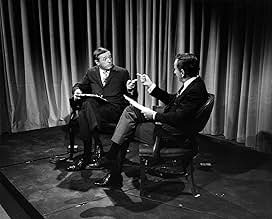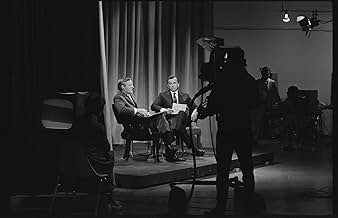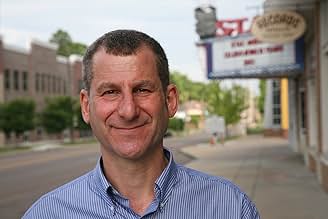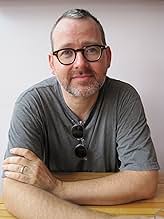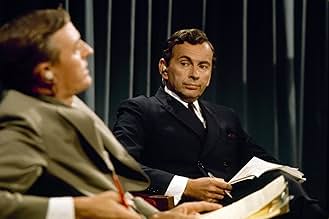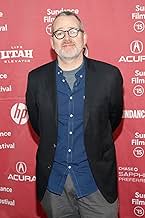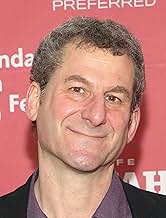IMDb RATING
7.6/10
6.6K
YOUR RATING
A documentary on the series of televised debates in 1968 between liberal Gore Vidal and conservative William F. Buckley.A documentary on the series of televised debates in 1968 between liberal Gore Vidal and conservative William F. Buckley.A documentary on the series of televised debates in 1968 between liberal Gore Vidal and conservative William F. Buckley.
- Directors
- Writers
- Stars
- Awards
- 6 wins & 27 nominations total
Gore Vidal
- Self - Debater
- (archive footage)
William F. Buckley
- Self - Debater
- (archive footage)
Noam Chomsky
- Self
- (archive footage)
Patricia Buckley
- Self - Buckley's Wife
- (archive footage)
Sam Donaldson
- Self - Correspondent, ABC News
- (archive footage)
Howard K. Smith
- Self - Anchor, ABC News
- (archive footage)
- Directors
- Writers
- All cast & crew
- Production, box office & more at IMDbPro
Featured reviews
Turn back the clocks fifty years and we find the birthplace of today's angry, confrontational news programming. In the late sixties, standard operating procedure for network television reporting was straight, impartial, monotone and almost entirely fact-driven. ABC, at the time a very distant third to perennial front-runners NBC and CBS, gambled on rowdy, opinion-driven segments during their convention coverage and won... or did we all lose?
At the heart of it all we find the conservative intellectual, William F. Buckley, and his opponent / counterpoint, the liberal author Gore Vidal, who embark upon a series of fiery debates: one for each night of their respective parties' conventions. In retrospect, their early arguments seem downright civilized - both are eloquent, engaging, brilliant conversationalists and they make for a fascinating contrast - but as the routine bears on and the speakers' attacks grow more personal, the cordiality of their discourse deteriorates. Finally, after slyly baiting his hooks for several such confrontations, one speaker elicits a jolting moment of unguarded, contemptuous rage from his opponent and, knowing his battle won, smugly settles in to enjoy the moment.
It's difficult to get completely behind either man, really. Each spins a mesmerizing oral web, but they also fall into the trap of continually one-upping each other, and that betrays the spirit of the debate. Personally, I'd love to spend a dinner party with either, but wouldn't want to make a habit of it. Deeply interesting historical material that answers many questions about how we arrived at this era of brash 24-hour opinions and endlessly question-dodging presidential debates.
At the heart of it all we find the conservative intellectual, William F. Buckley, and his opponent / counterpoint, the liberal author Gore Vidal, who embark upon a series of fiery debates: one for each night of their respective parties' conventions. In retrospect, their early arguments seem downright civilized - both are eloquent, engaging, brilliant conversationalists and they make for a fascinating contrast - but as the routine bears on and the speakers' attacks grow more personal, the cordiality of their discourse deteriorates. Finally, after slyly baiting his hooks for several such confrontations, one speaker elicits a jolting moment of unguarded, contemptuous rage from his opponent and, knowing his battle won, smugly settles in to enjoy the moment.
It's difficult to get completely behind either man, really. Each spins a mesmerizing oral web, but they also fall into the trap of continually one-upping each other, and that betrays the spirit of the debate. Personally, I'd love to spend a dinner party with either, but wouldn't want to make a habit of it. Deeply interesting historical material that answers many questions about how we arrived at this era of brash 24-hour opinions and endlessly question-dodging presidential debates.
A well-constructed must-see documentary for anyone who is the least bit interested in the politics of journalism. Don't worry that you won't recall/aren't aware of the background. The filmmakers do an excellent job of setting the stage, and an even more impressive job of avoiding the actual political issues in order to focus on the medium. If you want to know how we got where we are, start at the beginning. This is the genesis of punditry and personality-driven journalism. This is not to say that this little slice of evolution is necessarily bad. As the film points out, prior to 1968 the presentation of news was quite static, with little, if any, chance for anything out of the mainstream to make it out of the studio. Now the genie has been loosed from the bottle, and he has truly been feeling his oats for the past several years. It's up to us to rein him in, give him focus, and pray that we can find some common ground before the growing political mitosis reaches the point of no return.
The legacy of William F. Buckley, Jr. is not necessarily his 'National Review'; it isn't his devotion to the Buckley pere's hatred of FDR's New Deal, an act deemed a patrician's treachery to his class; it is the implosion of what his brother Reid concretes him as a revolutionary who ushered in the conservative revolution that we see in the impossible array of 17 candidates for the 2016 Republican nomination for the American presidency and the rise of Donald Trump. But, in 'Best of Enemies' trans-political make over is a glint in Buckley's eye as he faced the talented Gore Vidal as they 'commented' on the 1968 Republican convention in Miami and then the Democratic convention in Daley's Chicago. Who has read Buckley's apologia pro sua vita as spy for the FBI 'God and Man at Yale' today? Brilliant, effete, an amateur of the harpsicord,a seasoned sailor, he thought of himself the American heir to the little read GK Chesterton, in his affected speech. He could demolish in high disdain the arguments of his guests on 'Firing Line', guests like Norman Mailer, Allan Ginsberg and the like. Buckley was a man of the right--God, Country, Law and Order, who fought those critics of his values not necessarily in the name of freedom and humanity but in defense of older medieval values by attacking contemporary secular culture. And the embodiment of his distaste was the writer, playwright and commentator on things cultural and political Gore Vidal. ABC pitted these two 'aristocrats' of polished English as a wedge in the wall-to-wall coverage of the conventions by rivals CBS and NBC, at a time nightly television news was accepted more or less straight by the American people. From the get go, it was obvious that these two mavens of the Verb mutually loathed one another. Buckley shucking and sliding verbally, eyes popping, a supercilious grin on his lip as he flung mud at Vidal, not so much on what he said about the convention but for what he stood for. Remember, Gore Vidal had broken taboos for his 'Myra Breckenridge', about a transgendered man, light years ahead of the much admired Caitlin Jenner, a Republican. To Buckley, the writer of note was an enemy of God and patrician values and yes even to an elite education which Gore Vidal didn't pursue--he was a drop out who joined the Army during WW2, serving in Alaska where he wrote his much praised 'Williwaw'. Vidal was a 'revolutionary' in his own way; he published 'The City and the Pillar', which had a homosexual theme, that so exasperated the Old Grey Lady, the New York Times, which boycotted reviewing any of his books till decades later when they couldn't ignore his obvious talent. And in Gore, Buckley met more than his equal, so much so that until his death he wouldn't pronounce the V word. Buckley and Vidal were bellwethers; each had a finger on the rage and discontent of the times. And according to the talking heads, their 10 debates radically changed political discourse that now plagues our own day. 'Best of Enemies' is more than nostalgia, it is a palimpsest for the soul of the American soul. Buckley was an admirer of authoritarianism that Vidal was not. And it was to Vidal's credit that he pierced the supercilious armor of Buckley that, despite the adulation of his peers, rendered a life of hobnobbing with the rich and famous, the anti-Semites and racists, made him lose his 'cool' and restful nights of sleep. Even though he called Vidal a 'queer' (which wasn't a slur a half-century ago), Vidal suspected that he was a closet case, going as far as saying he was an incarnation of Myron Breckenridge. (For those who want to read about the conventions in Miami and bloody Chicago,Norman Mailer's 'Miami and the Siege of Chicago' is not a bad place to begin.
Best of Enemies is a fascinating documentary film about a series of nationally televised debates in 1968 between two public intellectuals, the liberal Gore Vidal and the conservative William F. Buckley Jr. If that doesn't sound very interesting you couldn't be more wrong. This is a film about two men who absolutely hated each other. Two extremely clever men who fought each other live on television by debating with each that eventually led to personal insults being thrown at each other and it's mesmerising viewing. I have to admit I had never heard of these men before and that's probably because these debates happened a couple of months before I was born but I do know now and I feel much better off for it.
"You have to have a mind of winter to see nothing that is not there and nothing that is"
- Wallace Stevens 'The Snowman'
Did you know
- TriviaThe film-makers shot an interview with Gore Vidal, but ultimately decided not to use it, so he only appears in archive footage.
- Quotes
Richard Wald: ABC was the third of the three networks. It would've been fourth, but there were only three.
- Crazy creditsThere is a short scene after the credits showing footage of an interview with Buckley.
- ConnectionsEdited into Independent Lens: Best of Enemies (2016)
- How long is Best of Enemies: Buckley vs. Vidal?Powered by Alexa
Details
- Release date
- Country of origin
- Official site
- Language
- Also known as
- Best of Enemies
- Production companies
- See more company credits at IMDbPro
Box office
- Budget
- $1,000,000 (estimated)
- Gross US & Canada
- $892,802
- Opening weekend US & Canada
- $50,378
- Aug 2, 2015
- Gross worldwide
- $892,802
- Runtime
- 1h 27m(87 min)
- Color
Contribute to this page
Suggest an edit or add missing content


